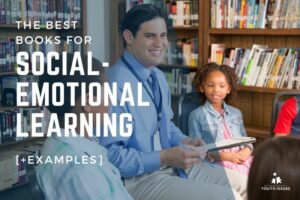
Menu

Books are a valuable resource for school counselors, mental health professionals, teachers, and parents. They can be used to educate students about life skills and social emotional learning (SEL) topics, provide support to students who are struggling with big feelings, and inspire students to reach their full potential.
Books can be great resources in several ways. They can provide information and support on a variety of topics, such as managing emotions, growth mindset, self-control, and building positive relationships. Picture books can also be used in teaching young learners important life skills, coping styles, and problem-solving strategies. In addition, books can help students develop empathy and understanding for others.
 Marcy’s Having All the Feels by Allison Edwards
Marcy’s Having All the Feels by Allison EdwardsMarcy wanted to be happy, but all her other emotions kept popping up and at the worst times! She didn’t like feeling embarassed, jealous, or sad. Couldn’t she just be happy all the time? This children’s book explores how sometimes feeling so many emotions doesn’t feel so good, but every feeling has its value. Also available on Amazon.
 How to Crack Your Peanut by Allison Edwards
How to Crack Your Peanut by Allison EdwardsDiego doesn’t understand why he gets angry and loses his temper. His counselor shares with him about the amygdala, a peanut-shaped part of his brain. Once Diego learns how his brain works, he understands why he behaves this way, along with three tips to remain calm. Also available on Amazon.
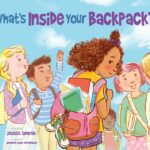 What’s Inside Your Backpack? by Jessica Sinarski
What’s Inside Your Backpack? by Jessica SinarskiZoey Harmon wants to feel carefree, but annoying “books” in her backpack keep weighing her down – books like anxety and shame. Kids everywhere are carrying heavy backpacks that are filled with more than just textbooks. Everyday they also carry the heavy load of hard life experiences and big emotions. This book features ways to build resilience in body and mind, and helps children effected by trauma realize how strong they really are! Also available on Amazon.
 Grief is Like a Snowflake by Julia Cook
Grief is Like a Snowflake by Julia CookGrief looks different for everyone. With his supportive family, Little Tree learns to process and accept his father’s death by learning what is really important in life, and that his father’s memory will last forever. This endearing story provides a safe and encouraging approach to the hard subjects of loss and death. Also available on Amazon.
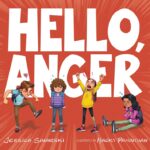 Hello, Anger by Jessica Sinarski
Hello, Anger by Jessica SinarskiThere is a lot that is carried in the backpacks of the kids at Sunnyvale Elementary – including things you can’t see, like confusing emotions and big feelings. One day a hot book keeps falling outday and exploding onto everyone: ANGER! It’s time for the students to figure out what is going on underneath those angry feelings. Also available on Amazon.
 Worry Says What? by Allison Edwards
Worry Says What? by Allison EdwardsAuthor of best-seller Why Smart Kids Worry, Allison Edwards, shows how anxiety whispers fears to kids and then gives ways to silence those worries. With actionable tips throughout, a story that resonates, and playful illustrations, Worry Says What? will help kids (and grownups) change their thinking when fearful thoughts start and turn those thoughts into helpful reminders of all they can accomplish. Also available on Amazon.
 Felix and the Feelings Formulas by Kate Bartlein
Felix and the Feelings Formulas by Kate BartleinWhat if we could make a formula to help us in tough situations? Felix always has two things with him wherever he goes: Hank, his stuffed rat, and his Feelings Formulas notebook. Hank is a friend who’s always there, and the Feelings Formula notebook helps Felix figure out how to handle problems and challenging experiences on his adventures. Also available on Amazon.
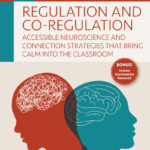 15-Minute Focus: Regulation and Co-Regulation by Ginger Healy
15-Minute Focus: Regulation and Co-Regulation by Ginger HealyA great resource for courselor, educators, and parents! Packed with clear definitions, facts, stories, and talking points, this book is rooted in the understanding that relationships are the priority – it only takes one committed grown up to help a kid heal and build grit through co-regulation. Also available on Amazon.
 Flooded by Allison Edwards
Flooded by Allison EdwardsWhen your brain thinks there is danger nearby, you will go instantly into one of three zones – fight, flight, or freeze. You’re in The Flood Zone. This book explains how to identify feelings, learn what triggers those emotions, and provides practical tips to manage feelings in a healthy way. Also available on Amazon.
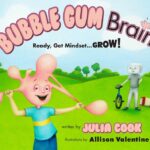 Bubble Gum Brain by Julia Cook
Bubble Gum Brain by Julia CookBrick Brain and Bubble Gum Brain are two children with VERY different mindsets. This delightful picture book teaches children (and adults) the important lesson that becoming is better than being. Having a growth mindset can open the doors to a world of possibilities! Also available on Amazon.
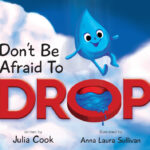 Don’t Be Afraid to Drop by Julia Cook
Don’t Be Afraid to Drop by Julia CookHopp the raindrop is afraid of new things and is content with his normal life. He soon learns that staying where he is holds him back from impacting those around him. Don’t Be Afraid to Drop is a story for anyone who is transitioning to new things in their lives. From kids entering kindergarten, to adults looking at retirement, and everyone between, this playful analogy will give readers a positive outlook on change, taking changes, and giving back. Also available on Amazon.
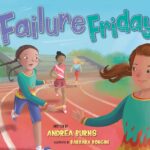 Failure Friday by Angela Burns
Failure Friday by Angela BurnsWhen Emma finds out she made the track team, she’s excited…and a little scared. It quickly becomes clear that Emma isn’t the fastest one in her family. Or the most coordinated. Emma begins to consider giving up…until her teacher invites a special guest to share with her class about failure. The speaker surprises them by saying that you don’t need to be afraid of failing – it’s actually something to celebrate! As her friends share their own failures, Emma realizes that maybe failure is actually a stop on the road to success. Also available on Amazon.
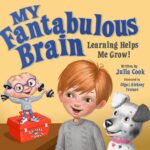 My Fantabulous Brain by Julia Cook
My Fantabulous Brain by Julia CookTake the “T” out of “CAN’T” and the “DON’T” out of “I DON’T KNOW!” This book encourages growth mindset and provides practical homework and study skills. Children will learn that everyone needs help sometimes, and there are tools to make our brains stronger! Also available on Amazon.
 There’s No Dream Too Tall by Amie Dean
There’s No Dream Too Tall by Amie Dean“The world is wide open; there’s no dream too tall. For a boy or a girl, whether big or quite small! There are millions of choices no end to the list. So, look deep in yourself and consider your gifts.” By showing children that their unique strengths can help them become who they want to be, we grant them the permission and power to dream. Also available on Amazon.
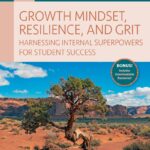 15-Minute Focus: Growth Mindset, Resilience, and Grit by Raychelle Cassada Lohmann
15-Minute Focus: Growth Mindset, Resilience, and Grit by Raychelle Cassada LohmannWhen kids encounter obstacles they need to find healthy ways to persevere, cope, and rise to the top. In this book, you’ll discover Growth Mindset, Resilience, and Grit as superpowers, the power of a positive outlook, the benefits of cognitive defusion, and strategies for building grit in students. Also available on Amazon.
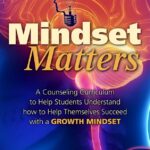 Mindset Matters by Lisa King
Mindset Matters by Lisa KingThe lessons in this book will provide students with a foundation of brain science, the magic of grit, and the benefits of learning, which will help them see the positive outcomes of having a growth mindset. Also available on Amazon.
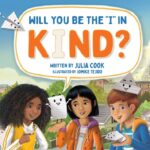 Will You be the “I” in Kind? by Julia Cook
Will You be the “I” in Kind? by Julia CookMaxine liked to pick on kids…especially Winston. No one was okay with the way she acted, but they were too scared to do anything. Bully B.E.A.N.S. guides kids in understanding how to identify bullying and provides impactful and clear tips for both bystandeers and targets. Also available on Amazon.
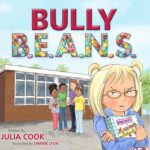 Bully B.E.A.N.S. by Julia Cook
Bully B.E.A.N.S. by Julia CookMaxine liked to pick on kids…especially Winston. No one was okay with the way she acted, but they were too scared to do anything. Bully B.E.A.N.S. guides kids in understanding how to identify bullying and provides impactful and clear tips for both bystandeers and targets. Also available on Amazon.
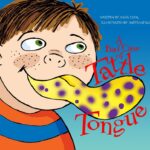 A Bad Case of Tattle Tongue by Julia Cook
A Bad Case of Tattle Tongue by Julia CookJosh tattles too much. One night Josh awakens to find his tongue is yellow, long, and covered in purple spots! This humorous picture book offers a clever way to address the tattling problems that take classroom energy and halt teaching opportunities. Also available on Amazon.
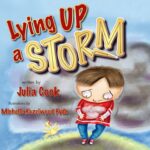 Lying Up a Storm by Julia Cook
Lying Up a Storm by Julia CookLevi kinda makes up stuff to say when he doesn’t like the truth. But he soons finds out that his “insides start to storm.” This is a great book to help kids learn not only the consequences of telling lies, but also how a lie can lead to telling many more. Also available on Amazon.
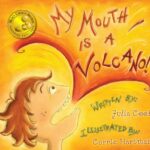 My Mouth Is A Volcano by Julia Cook
My Mouth Is A Volcano by Julia CookLouis is always interrupting! When he wants to say something, his words jiggle and wiggle, grumble and rumble, right before he ERUPTS (or interrupts). This picutre book takes an gentle approach to the habit of interrupting. Kids will learn a witty technique to help them better control their words and thoughts. Also available on Amazon.
 Personal Space Camp by Julia Cook
Personal Space Camp by Julia CookWhen space expert Louis is invited by the school principal to Personal Space Camp, he soon learns that personal space isn’t about Saturn’s rings, lunar landings, or space ice cream. This creative and fun children’s book focuses on the complex issue of respect for other’s physical boundaries. Also available on Amazon.
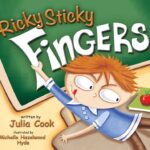 Ricky Sticky Fingers by Julia Cook
Ricky Sticky Fingers by Julia CookRicky is a boy that can’t seem to understand that it is wrong to steal. Through a humorous tale, kids will learn the concept of ownership and what it feels like when someone doesn’t respect what is yours. Also available on Amazon.
Social-emotional learning books can be great resources for school counselors, mental health professionals, teachers, and parents. They can help students see that they are not the only one dealing with an issue, offer nonjudgmental mental health support, and teach students social and emotional skills and self-awareness. They can help students to develop empathy and understanding for others. When choosing books/picture books for school counseling, it is important to consider the age, developmental level, and interests of the older and younger readers. It is also important to choose books that are accurate and informative. There are several ways to use books in school counseling sessions, such as reading aloud to students, having students read books independently or in small groups, leading discussions about books, and using books when teaching social-emotional learning skills and problem-solving strategies.
Sign up for our Newsletter
The semi-monthly eNewsletter features:
Please note that we use cookies necessary for the functioning of our website and to optimize performance. To learn more about our cookies and how we use them, please read our Privacy Policy.